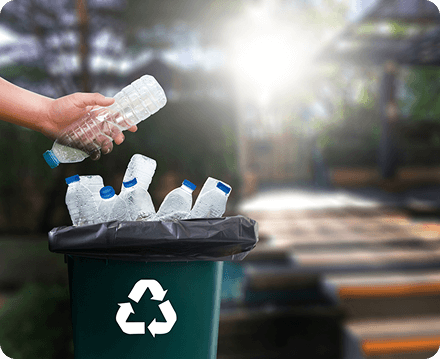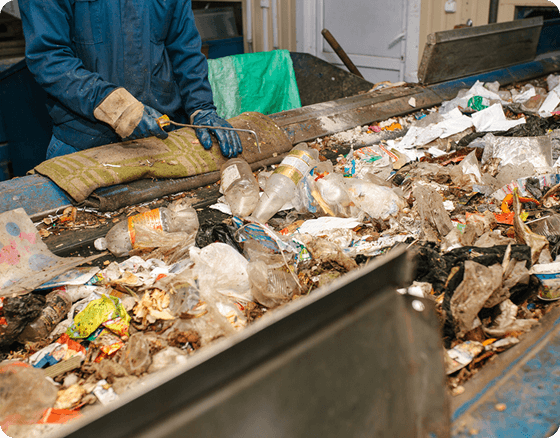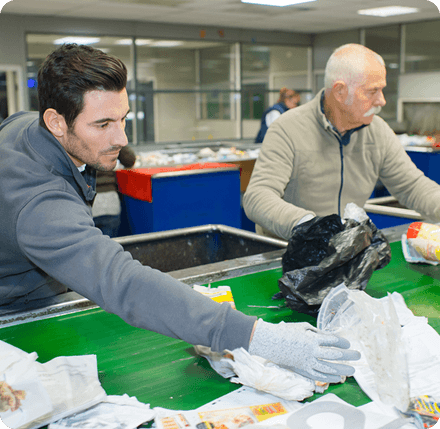
The increasing volume of plastic waste has become a significant environmental challenge, with millions of tons of plastic ending up in landfills and oceans each year. This surge in plastic waste not only pollutes our environment but also poses a threat to wildlife and human health. Addressing this critical issue requires innovative and effective recycling solutions. Elima is at the forefront of this effort, providing comprehensive plastic waste recycling services. By leveraging advanced technologies and sustainable practices, Elima helps businesses and communities manage and recycle plastic waste efficiently, contributing to a cleaner, greener future.

Walk down any busy street in India, and you’ll see it—plastic. It’s everywhere. Bottles rolling on the road. Grocery bags flying in the wind. Wrappers dumped in corners. Once, plastic felt like a magic fix for our fast lives. Now, it’s one of the country’s biggest trash problems.
But here’s the twist: recycling is slowly flipping that script. By giving old plastic a new job, we’re not just clearing the mess,we’re also making less of the stuff to begin with. What felt like a boring cleanup task now feels like a smarter way to live.

It’s pretty basic. Got old plastic? Don’t dump it. Break it down. Use it again. Could be bottles, wrappers, bags ,whatever. Instead of clogging drains or stuffing landfills, that plastic gets a second shot.
Recycling saves energy. Cuts down smoke and stink. Makes sure we don’t waste what we already have. It’s about shifting from “use and toss” to “use, rethink, reuse.”
Recycling looks simple on paper. Collect plastic. Sort it. Reuse it. But out in the real world? It’s a mess. Nothing’s clean. Systems are patchy. People mix waste. And most of us don’t even know what’s recyclable and what’s not. Still, we’ve got to do it. Because the alternative? More garbage, more pollution, and less room to breathe.
Here’s what usually messes things up:
That leftover juice or greasy food box? It ruins the whole batch. Clean plastic is hard to find.
In smaller towns or villages, there aren’t enough bins or trucks. So plastic just gets dumped or burned.
Wrappers with layers (like chip packets) are tricky. They can’t be pulled apart easily.
Most people throw everything into one bin. No one really sorts plastic from other waste.
A lot of folks don’t even know what kinds of plastic can be reused.
Even with all these problems, we can’t skip recycling. It helps keep plastic out of the ocean, cuts down on making new stuff, and slows the pileup in landfills. It’s not perfect,but it’s necessary.
Plastic isn’t just one thing. Some types are easier to recycle than others, while some often go straight to the bin. At Elima, we carefully handle and recycle the plastics that can be processed, ensuring less waste ends up in landfills. Here are the usual suspects:

You see this in water bottles and soda bottles. It’s clear and light. Recyclers love it.

Think of milk jugs, shampoo bottles, and laundry containers. Tough stuff, and pretty easy to reuse.

Found in plumbing pipes and some packaging. This one’s tricky. Not always accepted for recycling.

Used in grocery bags, cling film, and those soft squeeze bottles. Can be recycled, but many places still don’t.

Straws, food containers, bottle caps.

Disposable plates, cutlery, foam packaging.

A mixed bag of more complex materials.
Sorting these properly is the foundation of any recycling effort.
Recycling works best when we start it ourselves—right at home, at school, at the shop, wherever. It’s not hard. Just takes a little care.
Here’s what you can do:
Rinse stuff – Give bottles and containers a quick wash before tossing them.
Sort it out – Keep plastic away from food scraps and paper. Mixing ruins everything.
Check the number – Most plastic has a number (1–7). Some are easier to recycle than others.
Ditch single-use bags – Carry a cloth bag. Saves money, saves plastic.
Join local drives – Your area might have collection points or recycling events. Show up.
These small things might feel tiny, but when millions do it, the difference is huge.


Conservation of Natural Resources
Recycling plastic reduces the need to extract and process raw materials like petroleum or natural gas. This conservation of natural resources helps preserve ecosystems and reduces environmental degradation.
Energy Savings
Producing new plastic from scratch is energy-intensive and generates significant greenhouse gas emissions. Our recycling processes require far less energy, resulting in substantial energy savings and a smaller carbon footprint.
Waste Reduction
By recycling plastic waste, Elima diverts it from landfills and incineration, significantly reducing the burden on waste management systems. This helps decrease pollution and conserves valuable landfill space.
Partnering with Elima for plastic waste recycling not only benefits the environment but also promotes resource conservation, energy efficiency, waste reduction, and economic growth, paving the way for a sustainable and responsible future.
The first stage of recycling plastic waste involves the systematic collection of discarded plastic materials. This can be achieved through various channels, such as curbside collection, drop-off centres, or specialized recycling programs. Efficient collection systems implemented by Elima ensure a steady supply of plastic waste for recycling facilities, minimizing environmental litter and maximizing resource recovery.
Once collected, the plastic waste is transported to Elima's recycling facilities, where it undergoes a rigorous sorting process. Different types of plastics are separated based on their composition, such as PET (polyethylene terephthalate), HDPE (high-density polyethylene), PVC (polyvinyl chloride), and more. Effective sorting is crucial as it enables the application of appropriate recycling methods for each type of plastic, ensuring higher efficiency and quality in the recycling process.
After sorting, the plastic waste is fed into shredders, where it is broken down into smaller, more manageable pieces. These shredded pieces are then thoroughly washed to remove any contaminants, such as dirt, labels, or residual content. This cleaning process is essential to ensure that the recycled plastic meets high-quality standards and is free from impurities that could affect its reuse.
The cleaned plastic shreds are subjected to a process called extrusion, where they are melted down and reformed into small pellets. These pellets, also known as nurdles, serve as the raw material for manufacturing new plastic products. The melting and pelletising stage is critical in transforming plastic waste into a usable and versatile form ready for various industrial applications.
The recycled plastic pellets are now ready to be utilised in the production of new plastic products. Elima collaborates with industries and manufacturers to incorporate these pellets into various items, such as packaging materials, containers, furniture, textiles, and more. By using recycled plastic, companies can reduce their dependence on virgin plastic, supporting a circular economy and promoting sustainable production practices.
The newly manufactured plastic products are distributed to retailers and consumers, completing the cycle. Elima promotes the use of recycled plastic products to create market demand and encourage sustainable consumption. By choosing products made from recycled plastic, consumers play a vital role in maintaining the closed-loop system and supporting environmental sustainability.
Finally, when recycled plastic products reach the end of their lifecycle, Elima ensures they are managed through effective end-of-life options. This includes further recycling, composting, or energy recovery through incineration. By implementing comprehensive waste management strategies, Elima ensures that recycled plastic waste is continuously utilised in the most environmentally friendly manner, minimising its impact on the planet.
It’s not just about less trash. Recycling plastic fuels jobs, saves money, and helps whole industries.
Here’s what usually messes things up:
Use recycled plastic as cheap raw stuff instead of making new plastic from scratch.
Save costs and get eco-friendly stamps for using recycled materials.
Turn old plastic into things like roads, tiles, or panels. Yep, even houses benefit.
Strengthens brand image and consumer trust through sustainability.
Run more smoothly when less waste clogs up landfills.
When businesses embrace recycled plastic, they don’t just save costs—they also win consumer loyalty. People now prefer brands that care about the planet.
We handle the whole thing—start to finish. We pick up the plastic, sort it out, clean it, shred it, and turn it into raw stuff that can be used again.
Some of it becomes pellets that factories can melt and shape into new things. The rest? We deal with it safely so it doesn’t end up hurting the planet.
Every step we take keeps the focus on doing it right, without trashing the environment. Our machines are solid, our places are certified, and we’ve got companies from all over trusting us to deal with their waste the smart way.
Our recycling services go beyond just basic plastics:
By managing such a wide range, we ensure materials are kept in use for longer, reducing overall waste.
Elima is leading the way to a landfill-free future with its comprehensive waste management services, which cover collection, transportation, and recycling. Our all-encompassing approach addresses a variety of waste types, ensuring we maximize the value of materials often considered 'waste.' Dedicated to helping organizations achieve 'zero waste to landfill,' Elima goes beyond conventional waste management by using data-driven insights to eliminate waste from supply chains. Partner with Elima to transition smoothly towards sustainability, reduce your environmental impact, and support a circular economy where waste is continually repurposed and reused.
Contact now and book your consultation with Elima for expert plastic waste recycling services to ensure sustainable and efficient waste management.
Visit Our Page
The recycling landscape is quickly evolving with new innovations and growing awareness. Some promising trends include:
Breaking plastics down to their basic building blocks for endless reuse.
Turning one bottle into another without losing quality.
Smarter sorting systems for faster, more efficient recycling.
Bringing recognition and stability to the informal sector that does so much groundwork.
The future looks brighter. With these changes, plastic may no longer be seen as waste, but as a resource—one that drives industries while keeping our planet safe.